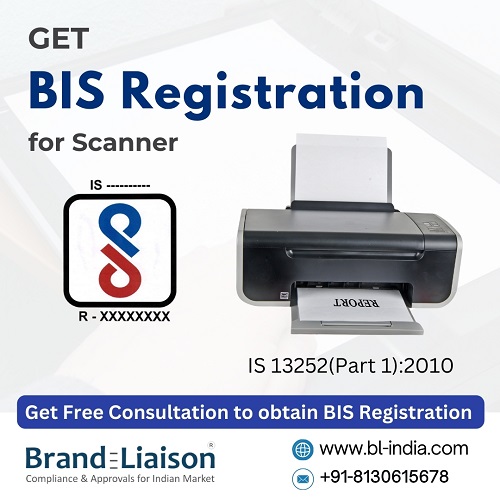Get BIS Registration for Your Scanner: Access the Lucrative Indian Market
As the Indian market booms, scanner demand skyrockets. But to capitalize, BIS Registration is essential.
BIS Registration Compulsory: The Bureau of Indian Standards (BIS) mandates BIS Registration for scanners under the Compulsory Registration Scheme (CRS). Selling unregistered scanners is illegal and attracts penalties. Safety and Quality Assurance: BIS Registration signifies your scanner meets Indian safety and quality standards (IS 13252 Part 1:2010), building trust and brand reputation. Market Access: Without BIS Registration, you’re locked out of the vast Indian market, hindering your growth potential.
we need BIS Registration: Both Indian manufacturers and foreign manufacturers exporting to India require registration. Importers: Importers can act as Authorized Indian Representatives (AIRs) for foreign manufacturers, but the license is issued to the manufacturer.
The Registration Process: Verify the relevant Indian Standard (IS) for your scanner type. Apply through the BIS online portal, attaching the necessary documents. Factory Inspection: BIS officials may inspect your manufacturing facility (or your supplier’s, if importing).
Timeframe: Allow 3-6 months for processing, depending on product complexity and documentation accuracy. Costs: Budget for application fees, testing charges, and potential consultancy support. Documentation: Ensure complete and accurate technical documentation and test reports. Updates: Maintain compliance by renewing your license and addressing any changes in product specifications.
A hardware tool for taking pictures, scanning documents, or digitizing objects into digital format is called a scanner. Using sensors or cameras, it first scans the object before turning the visual data into a digital image that can be modified, stored, or printed on a computer. Digitizing images, papers, artwork, and other printed items into computer format so they can be accessed and edited is a typical usage for scanners. Scanners come in a variety of forms, each intended for a particular scanning application or task. These include flatbed, document, film, and 3D scanners.
Scanners provide many benefits, including effective information management and preservation, improved creativity, and the ability to operate remotely. Their significance is multifaceted and intimately linked to the continuous digital revolution in the globalized world of today.
The global scanner market is expected to reach a valuation of $8.7 billion by 2032, from an estimated $5.2 billion in 2022. From 2023 to 2032, this expansion is projected to occur at a compound annual growth rate (CAGR) of 5.7%.



